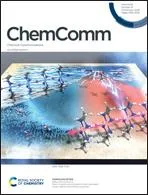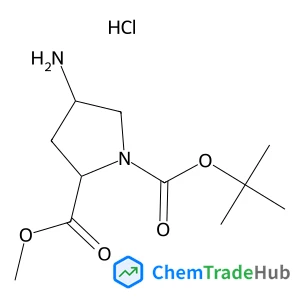The dilemma between acid and base catalysis in the synthesis of benzimidazole from o-phenylenediamine and carbon dioxide‡
Literature Information
Martin Hulla, Simon Nussbaum, Alexy R. Bonnin, Paul J. Dyson
The tandem synthesis of benzimidazole and other azoles can be achived by the N-formylation of ortho-substituted anilines followed by a cyclization reaction. However, CO2-based N-formylations with hydrosilane reducing agents are base catalyzed whereas the cyclization reaction is acid catalyzed. The mismatch in catalytic conditions means that only one of the steps can be catalyzed in a single pot reaction. While the N-formylation reaction is frequently the target of catalyst development, the cyclization reaction requires comparably much harsher reaction conditions. Identification of these difficulties lead us to the development of a one-pot, two-step synthesis of benzimidazole under mild reaction conditions employing acid catalysts.
Recommended Journals
Related Literature
IF 6.222
Strong circularly polarized luminescence of an octahedral chromium(iii) complexIF 6.222
Biomimetic hydrogels designed for cartilage tissue engineeringIF 6.843
Visible light-driven cross-coupling reactions of alkyl halides with phenylacetylene derivatives for C(sp3)–C(sp) bond formation catalyzed by a B12 complexIF 6.222
An improved fluorescent protein-based expression reporter system that utilizes bioluminescence resonance energy transfer and peptide-assisted complementationIF 6.222
Performance of electrode-supported silica membrane separators in lithium-ion batteriesIF 6.367
A new neodymium–phosphine compound for supercapacitors with long-term cycling stabilityIF 6.222
Selective light driven reduction of CO2 to HCOOH in water using a {MoV9}n (n = 1332–3600) based soft-oxometalate (SOM)IF 6.222
Synthesis of aviation fuel from bio-derived isophoroneIF 6.367
Permselective ion electrosorption of subnanometer pores at high molar strength enables capacitive deionization of saline waterIF 6.367
Source Journal
Chemical Communications

ChemComm publishes urgent research which is of outstanding significance and interest to experts in the field, while also appealing to the journal’s broad chemistry readership. Our communication format is ideally suited to short, urgent studies that are of such importance that they require accelerated publication. Our scope covers all topics in chemistry, and research at the interface of chemistry and other disciplines (such as materials science, nanoscience, physics, engineering and biology) where there is a significant novelty in the chemistry aspects. Major topic areas covered include: Analytical Chemistry Catalysis Chemical Biology and medicinal chemistry Computational Chemistry and Machine Learning Energy and sustainable chemistry Environmental Chemistry Green Chemistry Inorganic Chemistry Materials Chemistry Nanoscience Organic Chemistry Physical Chemistry Polymer Chemistry Supramolecular Chemistry
Recommended Compounds
Recommended Suppliers
 OÜ TorroSen
OÜ TorroSen Comercio y Representaciones SA de CV (Coresa de CV)
Comercio y Representaciones SA de CV (Coresa de CV) Macylab Instruments Inc.
Macylab Instruments Inc. KUKA Systems GmbH
KUKA Systems GmbH Shandong Pingyuan Four Rings Pharmaceutical Co., Ltd.
Shandong Pingyuan Four Rings Pharmaceutical Co., Ltd. Kern Technik GmbH & Co. KG
Kern Technik GmbH & Co. KG Univex, S.A.
Univex, S.A. Changsha Jianyun Non-ferrous Metal Co., Ltd.
Changsha Jianyun Non-ferrous Metal Co., Ltd. L DV Water Power Star Biology and Technology Co., Ltd.
L DV Water Power Star Biology and Technology Co., Ltd. Leyang Xingfa Manganese Industry Co., Ltd.
Leyang Xingfa Manganese Industry Co., Ltd.












![697235-38-4 - Methyl (1R,2R,3S,3aR,8bS)-6-({(2S,3R,6R)-6-[(1R)-1,2-dihydroxyethyl]-3-methoxy-1,4-dioxan-2-yl}oxy)-1,8b-dihydroxy-8-methoxy-3a-(4-methoxyphenyl)-3-phenyl-2,3,3a,8b-tetrahydro-1H-benzo[b]cyclopenta[d]
furan-2-carboxylate 697235-38-4 - Methyl (1R,2R,3S,3aR,8bS)-6-({(2S,3R,6R)-6-[(1R)-1,2-dihydroxyethyl]-3-methoxy-1,4-dioxan-2-yl}oxy)-1,8b-dihydroxy-8-methoxy-3a-(4-methoxyphenyl)-3-phenyl-2,3,3a,8b-tetrahydro-1H-benzo[b]cyclopenta[d]
furan-2-carboxylate](/structs/697/697235-38-4-ee3a.webp)

![37845-14-0 - 4,5-Dihydronaphtho[1,2-c]furan-1,3-dione 37845-14-0 - 4,5-Dihydronaphtho[1,2-c]furan-1,3-dione](/structs/378/37845-14-0-f8d0.webp)